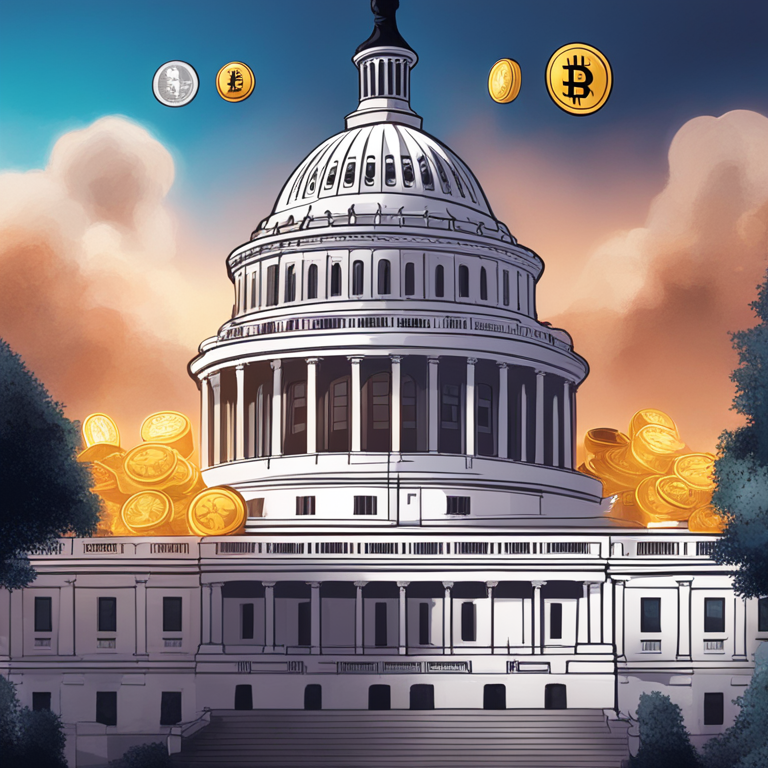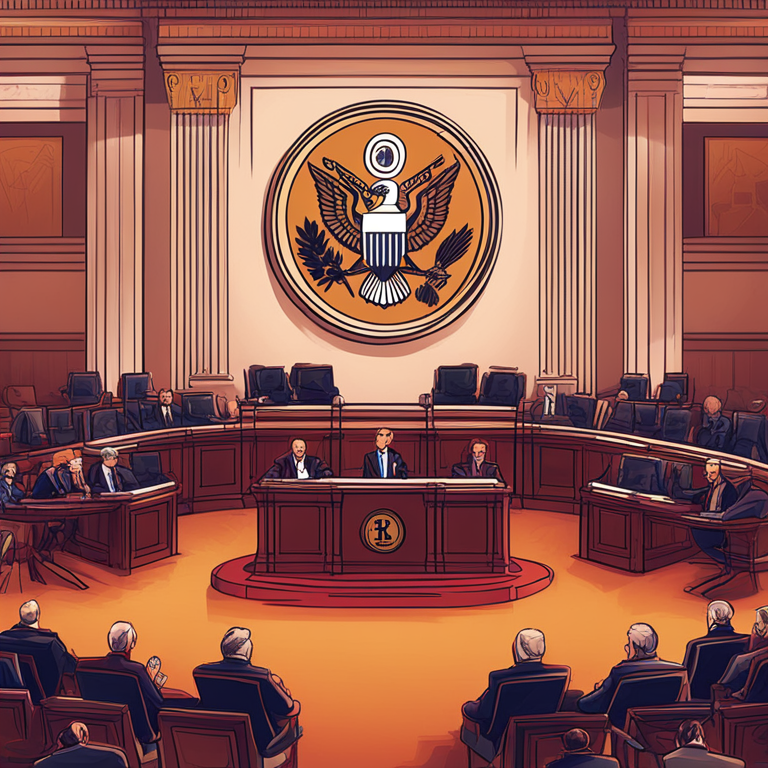
Introduction
Hey there, crypto enthusiasts! Prepare for some courtroom drama - but the kind you *actually* care about. Ripple's top legal eagle, Stuart Alderoty, is breaking out the party poppers over the SEC's latest blunder. Picture this: bipartisan bickering takes a backseat as both sides of the aisle find common ground in pushing back against what they see as an overextended arm of the SEC. Cue the applause! And you're wondering, "How does this affect my precious digital assets?" Well, let’s dive right into the juicy deets.
Senate Vote Against SEC Rule

Bipartisan Vote Details
Hold onto your hats, folks, because the U.S. Senate just dealt a major one-two punch to a controversial SEC rule - and it gets better. This wasn’t your run-of-the-mill, party-line throwdown. Nope, it was a bipartisan parade of unity. Republicans and Democrats joined forces (rare, right?) to give SEC Chair Gary Gensler's SAB 121 the boot. The rule, which would have compelled regulated banking institutions to shift customers' crypto holdings onto their own balance sheets, was met with a resounding "No, thank you!" from Senate members. Even crypto whale-watcher MicroStrategy co-founder Michael Saylor gave a Twitter thumbs up for the repeal. Score one for the crypto world!
Impact on Regulatory Custodial Services
Now, let’s talk about what this means for the custodial services that keep your crypto safe and snug. The SEC's rule, now flattened like a pancake, was a thorny one. Picture banks shivering at the thought of listing highly volatile crypto assets on their balance sheets - it's a bit like trying to pin jelly to a wall. Critics, waving their "We told you so!" banners, argued that it could severely cramp banks’ abilities to offer custodial services. Plus, there's the pesky problem of potentially infringing on crypto owners' rights. Even Hester Peirce, the SEC’s own crypto-friendly commissioner, labeled the rule approach as "scattershot." In short, the crypto industry gave a collective sigh of relief. The sky didn’t fall, and now they can move forward without this particular regulatory anvil hanging over them.

Industry response
The recent bipartisan vote in the US Senate has Ripple's chief legal officer, Stuart Alderoty, all smiles, as the motion to squash an anti-crypto SEC rule gained momentum. Alderoty wasted no time in lauding the Senate's decisive action, which many see as a significant setback for the Securities and Exchange Commission (SEC) and its chairman, Gary Gensler. This isn't just a ripple in the crypto pond—it's a tidal wave signaling bipartisan intolerance for regulatory overreach.
The chief legal officer of Ripple didn't mince words, labeling the SEC's move as unauthorized overreach. In Alderoty's world, even regulators should mind their manners and not overstep their bounds. And let's be honest, nobody likes a gatecrasher, not even in the legislative arena. He applauded the joined forces of both political parties, noting how crucial it is for lawmakers to work together on cryptocurrency-related bills. After all, the world of digital assets is complicated enough without partisan bickering making it worse.
In a regulatory tug-of-war, Gensler pulled back, defending his stance while Alderoty pulled forward, claiming victory. This move could reshape how banks and crypto services interact, paving the way for more amiable regulations in the future. It's not just about legislation—it's about keeping the crypto dream alive and well. And Alderoty seems all too ready to pop the champagne and toast to that.

Reactions from cryptocurrency luminaries
The cryptocurrency world has been buzzing like a busy bee after the Senate's vote, with many industry leaders chiming in. Michael Saylor, co-founder of MicroStrategy and a devout Bitcoin advocate, gave a thumbs-up to the Senate's decision. Saylor, known for his crypto evangelical zeal, couldn't help but share his excitement. After all, when you hold more Bitcoin than some small countries, you tend to worry about regulations messing with your treasure trove. Other digital currency influencers quickly followed suit, praising the Senate for putting the brakes on the SEC's controversial directive.
These luminaries argue that the SEC's rule would have hamstrung banks by forcing them to list crypto holdings on their balance sheets. This, they say with a collective eye-roll, would make it nearly impossible for banks to provide custodial services for digital assets. Critics argue this would be akin to asking a cat to guard a fish market. The inherent volatility of cryptocurrencies could wreck a bank's financial stability, they warn.
As if the rule's technical impracticalities weren't enough, there’s an emotional angle too. Cryptocurrency owners felt that their rights were being thrown under the bureaucratic bus. Higher barriers to entry into custodial services spelled more hoops for them to jump through. Given the current regulatory landscape, it’s no surprise these crypto titans voiced their concerns.
Criticism of SEC's approach
Argument by Commissioner Hester Peirce
Not everyone in the SEC camp is in love with these new regulations. Enter Hester Peirce, the commission’s token crypto-enthusiast. She has a penchant for shredding anti-crypto regulations like a rock star shreds guitar solos. Peirce dubbed the SEC's push as "scattershot," clearly indicating her disdain. She argues that the rules are not only inconsistent but also lacking in a coherent strategy for dealing with digital assets. Scattershot might be a polite way of saying the rules are all over the place and missing the target like a rookie archer.
Peirce is something of a guardian angel for crypto enthusiasts, often throwing a spanner in the works of anti-crypto rhetoric. She's been vocal about how the SEC shouldn’t stifle innovation with overly stringent regulations. Imagine a gardener trying to grow roses with a sledgehammer—it's just not going to end well. Her argument goes beyond just the complexity; it's about fostering an environment where digital assets can actually thrive.
Gary Gensler's defense
In the other corner of this regulatory boxing ring, SEC Chair Gary Gensler isn’t backing down without a fight. Gensler defended the rule by pointing out that this is not the first rodeo—previous 120 Staff Accounting Bulletins (SABs) have sailed through without much fuss. To him, the latest SAB hitting snags is puzzling. It’s like he brought a tried-and-true family recipe to a potluck, only to be told it tastes funny.
Gensler argues that the new rule is designed to bring more transparency and accountability to banks dabbling in the volatile world of cryptocurrencies. From his perspective, listing crypto holdings on balance sheets is a necessity to maintain financial stability and protect consumers. According to Gensler, this isn't a hurdle but a responsible step forward. After all, nobody wants a crypto-fueled financial meltdown on their watch.
Naturally, Gensler’s defense didn’t silence his critics, but it did outline his vision. He believes treating cryptocurrencies with the same seriousness as traditional financial assets is crucial. Whether the industry agrees or not, the debate between innovation and regulation isn't cooling down anytime soon. One thing's for sure: in the ever-evolving world of digital assets, the plot thickens.
Future legislation and Ripple's plans
The US Senate has thrown a spanner in the works of the Securities and Exchange Commission (SEC) with a bipartisan vote to quash a contentious crypto regulation. Ripple's chief legal officer, Stuart Alderoty, has been quick to air his jubilation, all but doing a victory jig in his latest statements. Let's unwrap this juicy legal melodrama and peek into how the future legislative landscape might look for Ripple and the wider crypto industry.
Bipartisan cooperation importance
In a world where cats and dogs fighting would be considered a normal day, it's rare to see bipartisan agreement on anything. However, when it comes to taking aim at SEC Chair Gary Gensler's "unauthorized overreach," it appears both parties have found common ground. Alderoty believes this cooperation is pivotal, stressing how significant it is for crypto-related bills to resonate across the aisle. Maybe bipartisan unity is the underdog that will finally save the day in a story full of regulatory monsters and crypto wizards.
Stablecoin bill
Politicians might not agree on much, but they are certainly buzzing about a new stablecoin bill. The thought of passing this bill has got lawmakers doodling dollar signs in their notepads, all while Ripple watches keenly from the sidelines. This bill is especially critical for Ripple, as it's been preparing to dive headfirst into the stablecoin pool, a venture that has earned it a few side-eye glances from the SEC. Perhaps someone should remind lawmakers that stablecoins aren't just Monopoly money but could play a major role in the economy of the future.

Ripple's stablecoin launch plans
Ripple has been busy brewing a potion in its cauldron, ready to launch its own stablecoin. But don't start popping the champagne just yet—this coin has already caught the attention of the ever-watchful SEC. As Alderoty celebrates this regulatory stumble by the SEC, Ripple remains laser-focused on its stablecoin ambitions. Perhaps with a little magic and a dash of bipartisan goodwill, Ripple's stablecoin might soon be shimmering on the horizon, promising a more streamlined and stable digital economy.
Conclusion
In conclusion, Ripple and the broader crypto industry are not just bystanders in the legislative arena—they are active players. Stuart Alderoty's celebration is a small but significant win in the larger battle for clearer, fairer crypto regulations. With bipartisan cooperation, a stablecoin bill in the works, and Ripple's own ambitious plans, the future of the crypto landscape is being reshaped. Whether you're a financial wizard or just a curious onlooker, one thing is for sure: the world of cryptocurrency is evolving, one legislative twist at a time.
Ethan Taylor
Ethan Taylor here, your trusted Financial Analyst at NexTokenNews. With over a decade of experience in the financial markets and a keen focus on cryptocurrency, I'm here to bring clarity to the complex dynamics of crypto investments.



